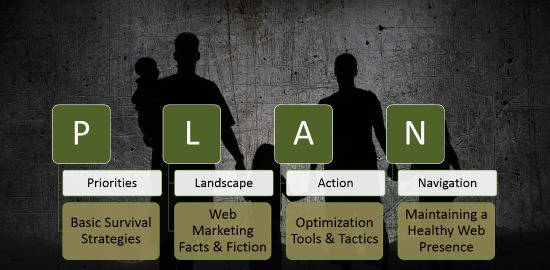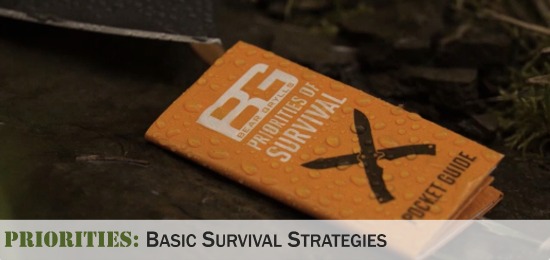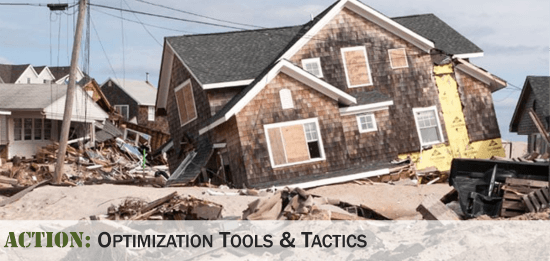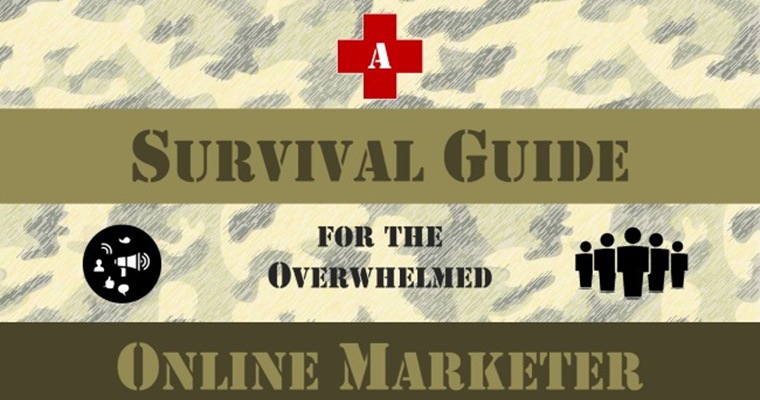Let’s face it, you will never have time to do all the things you want or think you should in web marketing. Even as you work your way through the seemingly endless list of to-dos, more are added every time Google changes its algorithm or a new best practice hits the scene.
How can an online marketer survive?
Online Survival Requires a P.L.A.N.

If you have ever read a survival handbook, getting through disasters and catastrophes comes down to having an action plan in place before such events occur. Survival gear, food stockpiles, and weapons will only do so much good without a plan in place. How will acquire the needed items? Do you know how to use them? How will you protect yourself, your family, and your supply cache?
In the zombie apocalypse, you’re more likely to end up being food for the hungry than getting fed if you don’t put together a plan before the first walkers rise from their graves. While the zombie apocalypse isn’t a reality, online marketing is, and there are actually striking similarities. The online world is littered with corpses of businesses who have tried SEO only to find they’ve been eaten alive by a more prepared competition!
In order to survive your own personal web marketing apocalypse, you must have a P.L.A.N.:
- Priorities: Basic online marketing survival strategies
- Landscape: Determine web marketing facts from fiction
- Action: Optimization tools and tactics you need to stay alive
- Navigation: Maintain a healthy web presence amidst evolving algorithms.
There is a lot of ground to cover, so we have to move fast.
Priorities: Basic Online Marketing Survival Strategies

There are a lot of competing priorities in online marketing, so I’m going to break it down into five distinct focuses. Each area noted below has its own merits and levels of success by themselves. However, when combined you can create a strong foundation for developing a successful web presence and marketing campaign.
1. Quick Victories
We all like quick victories. If you’re in a pinch and really need to see some results fast, invest some time into the following three things to get the most bang for your buck.
- Pay-Per Click: Setting up a pay-per-click campaign often gives you the most immediate results. Just be careful. Mismanagement can falsely convince you PPC doesn’t really work.
- Remarketing Campaigns: Remarketing campaigns provide an opportunity to “stalk” visitors and to re-engage with them after they’ve left your site. This can be responsible for a lot of sales you might otherwise have lost.
- Website Architecture: Website architecture can get pretty in-depth and detailed. You’ll generally need a programmer to get involved, but many times you’ll find some quick and easy changes that will make a huge impact.
2. Optimization Essentials
There are a lot of factors to consider when doing a full-optimization campaign, but the following items are essential to getting your campaign off the ground.
- Keyword Research: This is the foundation of all your online marketing efforts. Skipping keyword research can throw the rest of your marketing efforts off track.
- Titles and Tags: Pay attention to the page titles and other tags such as meta descriptions, ALT attributes, etc. These play a vital role in achieving rankings and compelling searchers to visit your site.
- Text and Links: Your content is vitally important. Be sure to speak your visitors’ language, using keywords they understand rather than industry jargon. Take the time to link key elements to other relevant pages within your site. Both internal and external links play a vital role in giving visitors what they want.
- Navigation Architecture: Make sure your navigation is search engine friendly. That means ensuring all pages are accessible within just a couple of clicks from the home page. Don’t offer too many or too few options. Keep it simple yet complete.
- Authority Building: On-page optimization will only get you so far without building your site’s authority and web presence. I’ll talk more about this later.
3. User Experience
Optimizing for rankings is a small part of a successful web marketing campaign. We also have to optimize for visitors. If we are failing the visitor, even #1 rankings won’t matter.
- Site Navigation: Not all navigation is good navigation. Make sure your main offerings are easy to see and don’t overburden your visitors with options. Drive them to what they want most.
- Conversion Optimization: Instead of pushing for more traffic, work on converting the traffic you already get. This provides much bigger gains overall.
- Voice: Use your content “voice” to set yourself apart from other sites in your industry. This is an opportunity to really make your site special and something worth coming back for.
4. Going Local
Local optimization is not relevant for every business, but it is more relevant than ever before as more people perform searches for local companies. If you deal with a local customer base at all, local optimization is mandatory. There are many specific strategies and factors to implement to ensure your site is both mobile friendly and optimized for local search, but here is where you start:
- On-Page Signals: There are a number of on-page signals considered in the search algorithms, from the implementation of schema code to using geo-targeted keywords properly on your site. Do a little digging to see what you can do to optimize your site for local keyword searches.
- Third Party Signals: Local optimization doesn’t end with your website. You may have to massage a number of off-site signals to provide search engines the fodder they need to assess your local presence and authority.
- Reviews: Getting reviews published, whether it be on your site or any number of third party review sites, is an important factor in how your site ranks. The more reviews you have and the better those reviews are, the more search engines will want you to rank for appropriate searches.
5. Interaction and Authority Building
As noted above, authority building is an essential component to being successful online. The following strategies will get you started creating an interactive web presence that earns authority in your online space:
- Social Media: Getting started in social can be as easy as using Twitter frequently, but Twitter alone does not complete a social media campaign. You need to be blogging and interacting with your audience on a regular basis. Social media isn’t about promotion, it’s about interaction. If you’re not interacting, you’re failing at social media.
- Reputation Management: Do you know what other people are saying about you online? You should. It’s critical to stay ahead of negative publicity before it get’s out of hand.
- Content Strategy: Having an ongoing content strategy helps establish you as an industry authority and allows you to build that expertise into a recognizable brand. Don’t let good content go to waste.
Landscape: Web Marketing Facts and Fiction

To have an effective online marketing strategy, you need to have a solid idea of the web marketing landscape. Part of that is knowing what is and what isn’t true. Many people find themselves engaging in poor web marketing practices because they once heard something that either never was or no longer is true.
Here are some common web marketing myths and facts to help you get your bearings:
- All You Need is SEO: Web marketing is vast. You should never focus only on one particular area. In fact, SEO itself is no longer really effective without being used in conjunction with other forms of online marketing.
- SEO is Dead or Dying: I’ve been hearing this since I started doing SEO back in 1998. SEO (and web marketing) will never die as long as there is an Internet and search engines to help us find what we are looking for.
- SEO is Expensive: This can be true for some very small companies. However, properly managed SEO should be focused on ROI. Regardless of your budget or time invested, ROI still doesn’t happen overnight, so be patient. SEO is an investment in your long-term success.
- SEO Destroys Usability: Not when it’s done right. Period.
- SEO is IT: SEO is marketing. While there are some definite IT (information technology) tasks involved in optimizing a website, they all come from a marketing standpoint. Don’t let your IT department handle your SEO.
- There are Quick SEO Solutions: Very rarely is this true, but by the way many companies sell optimization as a one-time solution, you’d never know it. There is no “Ta-Da” in SEO. Just hard work and a lot of patience.
- I Have to Submit My Site to Google: Not since the early 2000’s. If you do online marketing correctly, Google will find you.
- Meta Tags Improve Rankings: No, they don’t. But they are valuable in earning clicks.
- I Need #1 Rankings: Absolutely not! In fact, we’ve seen sites that have earned more money after they lost their top positions. Sometimes you have to lose the ranking battle to win the customer value war. Doing what’s best for your visitors is always a winning strategy.
- All You Need is Social Media: Social media is a great way to get noticed, build authority, and earn business. Some businesses even get rich on social media alone, but that’s not the case for most. When you pair your social media with good on-page optimization, you’re giving a one-two punch to your competition.
- Social Media is a Massive Productivity Killer: Social media does take a significant investment of time, which can be hard. But when done right, the ROI for it pays off.
- Social Media Directly Impacts Rankings: No, not directly, but it does provide a nice assist. What works great on social media usually works great for getting rankings as well.
- Guest Posting is Bad: Google would like you to think so but, if done well, it’s not going to hurt you. Just avoid guest posting networks and stay focused on quality.
- All You Need is Content Marketing: No, but content is an important part of growth and authority building and goes hand-in-hand with social media marketing.
- You Just Need More Content: The amount of content you do (or don’t) have may not be the problem. It may be the quality of your content that you need to improve.
- Your Content is Already Awesome: It’s possible, but I doubt it. Always look to improve and finding new and exciting things to produce. Think outside the box about the different kinds of content you can produce. Surprise your visitors with something cool and unexpected.
- All You Need is More Links: Links can help, but by themselves, their value is pretty limited. Any link building you do should always coincide with good on-page and site optimization.
- Links Don’t Matter Anymore: Links still matter. There is no foreseeable future where Google does not count links as a ranking factor.
- PPC Improves Rankings: Despite some antecedent evidence to the contrary, the paid and organic side of search have no impact on each other. However, they can have an impact on click-through rates which just might affect organic or paid algorithms. Don’t worry about what PPC does to your rankings. Just focus on a holistic web marketing campaign that delivers ROI in all avenues.
Action: Optimization Tools and Tactics You Need to Stay Alive

All the web marketing knowledge in the world is useless without action. But, their is good action and better action. Better action uses both wisdom and good web marketing tools to make tough jobs easier. Here are a few tools to help make your marketing campaigns more effective:
- Keyword Research: Google AdWords provides one of the best keyword research tools available. It’s also worth looking into Wordtracker and Visual Thesaurus.
- Website Analytics: Google Analytics is a very powerful and free analytics tool. There are a lot of more robust options out there, but most businesses will get more than they need from Google.
- On-Page Optimization: It’s one thing to eyeball the optimization of a page, but it’s always good to get some reinforcement. Try Moz On-Page Grader and Google’s Page Speed Insights.
- Website Architecture: I use three primary tools to review website architecture. With these you can get enough data to keep you busy: Google Webmaster Tools, Xenu Link Sleuth, and Microsoft IIS Search Engine Optimization Toolkit.
- Listening: There are far too many social media listening tools to mention here, so you’ll have to find the ones that work best for you. A few of the most popular ones are: Google Alerts, Feedly, and Hootsuite.
- Promotional Tools: There are tons of these as well, but here are five to help push you in the right direction: SproutSocial, RSS feeds, Buffer, Bit.ly, and email. RSS and email are not tools as we tend to think of them, but investing in those areas can be pretty darn effective at building your promotion base.
- Conversion Tools: I have to go back to Google Analytics on this, as it has some pretty sweet conversion optimization tools built right in.
Navigation: Maintaining a Healthy Web Presence Amidst Evolving Algorithms

Sometimes we let online junk food into our web marketing diet. And like most junk food, it’s good for a while, but eventually it comes back to bite you.
Here are some things you need to know about keeping a healthy web presence:
- Penguin Algorithm & Penalties: Google’s Penguin algorithm targeted sites that participated in poor linking practices. Links must be earned naturally, not by purchasing or mass submissions. Sites that built up large amounts of low quality links saw their site suffer with this update.
- Panda Algorithm & Penalties: Google’s Panda algorithm targets sites with poor content. Anything that was over-optimized or provided very little value was hit. If your site has a lot of duplicate content or content that provides little value to your visitors is in danger of being hit with this penalty if it hasn’t already.
- Hummingbird Algorithm: Google’s Hummingbird algorithm focused on the actual search queries as opposed to the websites themselves. Google now does a better job of understanding conceptually related words and topics. This means content should be less keyword and more topically focused.
- Over-Optimization: All of the above algorithms are designed to attack over-optimization and spammy optimization practices. Focus on building a great site and becoming an authority in your niche.
- Manual Action Notices: Google now sends out notices via Webmaster Tools to any sites found to violate Google’s guidelines. If you get one of these, you need to take action immediately.
- Getting Out of a Penalty: Once in a penalty, the only way out is to clean up the offenses. Google is never specific about what those offenses are, so you’ll have to do a bit of research to know what, exactly, you need to fix. But once you’ve cleaned up your mess, you can submit a reinclusion request. Or just wait for another algorithm update.
- Staying Out of a Penalty: Stop doing stupid stuff!
- Regular Architecture Checks: Look for potential on-site issues by running architectural tools on a regular basis. Find and fix problems as soon as possible.
- Ongoing Optimization of New Keywords: Keyword optimization isn’t done until you’ve optimized for every possible keyword that will drive targeted traffic to your site. Just. Keep. Going.
- Active Social Maintenance: Don’t just build up your social presence, but keep it maintained by staying actively involved and engaged with your followers.
- Ongoing Content Strategy: Just like social engagement, you need to constantly produce authoritative content. A website that is not producing new and great content is a dying website.
- Stay Educated: Web marketing is always evolving. Invest time each week to stay up to speed. If you lag behind in your education, you’ll fall behind in proper implementation.
Movement is Life

Web marketing never stops. It doesn’t sleep and it certainly never rests. It’s all about building momentum. The second you lose momentum, you are giving your competition a foothold to surpass you.
If you want to stay alive, you have to keep moving forward. Rankings earned can be lost and followers gained can become dispassionate about your products or services. Don’t become complacent in your marketing efforts. As soon as you do, you’ll be someone else’s stepping stone to success.
Note: This topic was also explored in a presentation, which can be viewed here:





